
Why should I have a heart screening test?
Heart screen applies to an individual without symptoms of heart disease, eg chest discomfort, palpitations, breathlessness. If one has symptoms, one should go for targeted heart evaluation and not general heart screening.
You should have periodic heart health screening tests because heart disease is common and has better outcomes when detected and treated earlier rather than later.
In Singapore, according to the Singapore Heart Foundation, approximately one out of three deaths is caused by heart diseases and approximately 17 people die from such conditions every day.
An individual’s risk for heart disease increases if he or she has any or a combination of the below-mentioned risk factors for heart disease.
Am I too young for a heart screening test?
The majority of people who experience a heart attack are 35 years or older. A heart attack risk increases with increasing age.
- It rises from 2 per 1000 persons in the 35 to 44-year-old age group, to 10 per 10000 persons in the 65 to 74-year-old age group and to 18 per 10000 persons 75 to 84-year-old age groups.
While heart attack can impact both sexes in old age, it has been observed that women are at a greater risk of dying.
This is why it is essential you regularly check for modifiable risk factors for heart disease. For example, elevated blood pressure and cholesterol levels, especially if you’re over 35 years old.
That said, the young were not spared:
- A study of young adults (45 years old or less) in Singapore published in 2012 revealed that young adults represented 8%-12% of all heart attacks during the 5-year study period.
- Young patients were more likely to be male, have a history of smoking and hyperlipidemia.
Smoking was the single most important modifiable risk factor in causing a premature heart attack.
In summary, if you have no risk factors for heart disease, then you should be checked for heart disease at the age of 35 years or older.
If you have risk factors for heart disease or have cardiac symptoms like chest discomfort, breathlessness, dizziness, you should be checked for heart disease as soon as you have the symptoms. Do not delay.
Below is the discussion on risk factors for heart disease.

Should I go for a heart screening test?
Anyone who has a high risk of heart disease should go for a heart screening test. An individual’s risk for heart disease increases if he or she has any or a combination of the below-mentioned risk factors for heart disease.
Non-modifiable risk factors
- Increasing age. If there are no other heart disease risk factors, males above 35 years old, females a few years after menopause.
- Male gender
- Family history of early heart disease
Modifiable risk factors
- Have the following heart unhealthy lifestyle habits
- Smoking,
- lack of physical activity,
- poor dietary choices
- Have the following medical conditions
- high cholesterol,
- high blood pressure, and
- diabetes mellitus
Other risk factors
- On, or had prior chemotherapy
- Had history of gestational hypertension
What is a heart screening test?
A heart screening test involves an initial consultation and follow-up consultation.
In the initial consultation, confidential and appropriate questions will be asked about your general, and heart health, heart health-related habits, e.g. physical activity level, smoking, and a review of cardiovascular symptoms, if any, and family history of premature heart disease or stroke. Following the history taking, there will be a targeted physical examination involving several important cardiovascular parameters by the cardiologist.
History taking and physical examination help doctors to better understand their patient’s cardiovascular and medical state before recommending specific diagnostic tests and interventions.
When coming for medical consultation, especially for heart check-ups, consider providing a list of medications you are taking, including vitamins, over-the-counter drugs and supplements.
The following investigations may be ordered as part of a heart check-up.
Electrocardiogram (ECG)
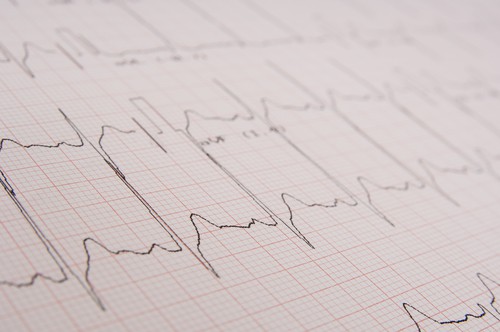 This is a non-invasive test that checks the heart’s electrical activity. It is used to check for abnormal rhythms (arrhythmias), and heart muscle damage. These in turn can assess for risk of stroke and heart disease.
This is a non-invasive test that checks the heart’s electrical activity. It is used to check for abnormal rhythms (arrhythmias), and heart muscle damage. These in turn can assess for risk of stroke and heart disease.
There are 3 main types of ECG that doctors will recommend depending on the patient’s heart condition:
- resting ECG, which is done while the patient is comfortably lying down
- ambulatory ECG wherein the patient has a small portable ECG recorder on the chest to monitor the heart for at least 24 hours while doing normal daily routines
- exercise/stress ECG, which is performed while patient is on treadmill stress test
Echocardiogram
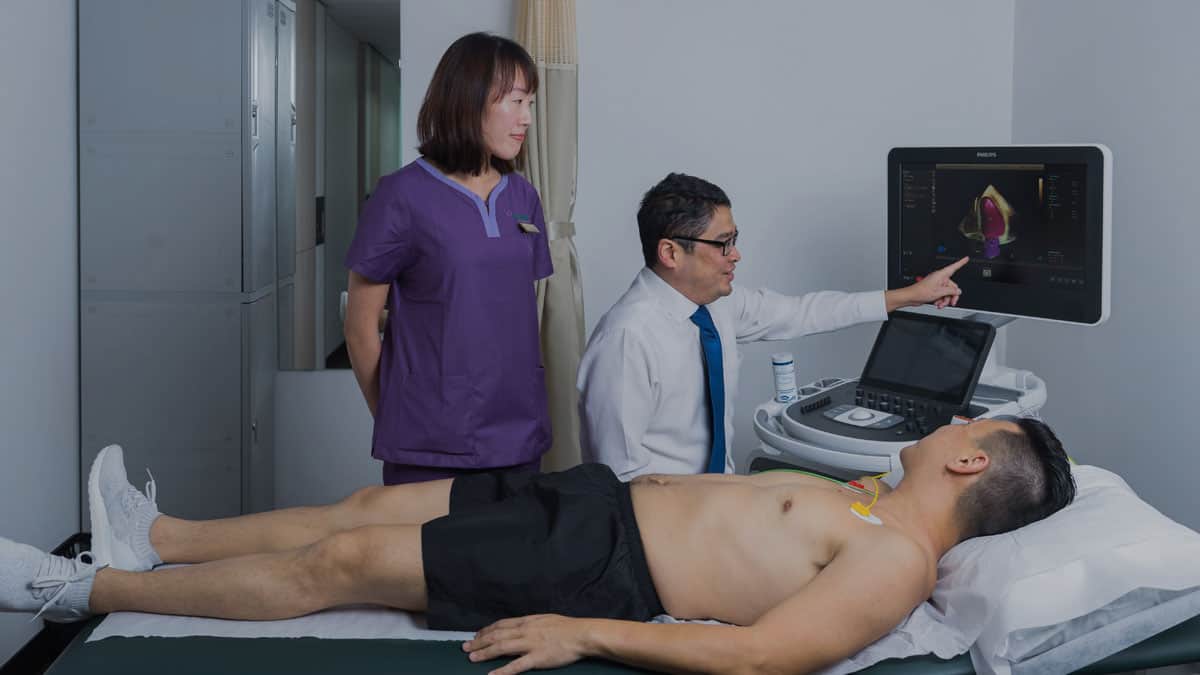 An echocardiogram is a non-invasive test that uses ultrasound to assess the condition of heart muscle, valves and blood flow. The sound waves make moving pictures of your heart so your cardiologist can get a good look at its size, shape, and function.
An echocardiogram is a non-invasive test that uses ultrasound to assess the condition of heart muscle, valves and blood flow. The sound waves make moving pictures of your heart so your cardiologist can get a good look at its size, shape, and function.
This test is very useful in checking for causes for symptoms of heart disease such as chest discomfort, breathlessness, palpitations, dizziness, or for assessing stroke risks.
In Gerard Leong Cardiology Clinic, we also use 3D, and strain rate methods to assess for cardiac systolic (contraction) and diastolic (relaxation) function parameters that have established implications in cardiac care management and outcomes.
If more detailed images are needed, transesophageal echocardiogram (TEE) may be needed. In TEE, your throat will be numbed with a local anaesthesia in the throat, you will be sedated, and relaxed and a small flexible tube containing a transducer is guided down your throat and into the to the gullet (esophagus) and stomach to get obtain clear images of the heart from behind the heart.
Stress Tests with Echocardiogram or ECG
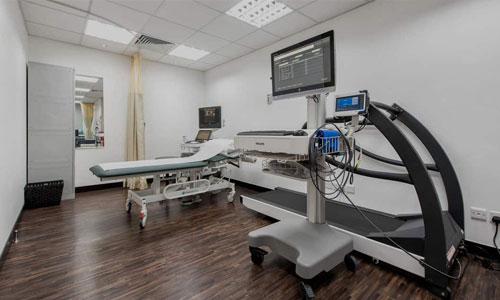 This is also known as stress echocardiogram. This test takes ultrasound images of an individual’s heart while at rest and while at maximum exertion on a treadmill.
This is also known as stress echocardiogram. This test takes ultrasound images of an individual’s heart while at rest and while at maximum exertion on a treadmill.
It is done to assess for heart disease, or it may be used for safe exercise prescription as part of heart health prevention, treatment, or maintenance. It is done to see if the individual’s heart function is adequate.
In the treadmill stress exercise electrocardiogram (ECG) procedure, electrodes (sensors) will be attached to the patients’ chest and are connected to an ECG machine. The patient will then be asked to walk on the treadmill, which will gradually become faster and steeper. The patient will be checked for symptoms, BP, heart rate and ECG at regular intervals. The patient should inform the attending healthcare professional if there are symptoms experienced while doing the stress test. The entire test can take around 30-45 minutes.
In a stress echocardiogram, the patient will be stressed physically as in the treadmill stress exercise electrocardiogram (ECG) procedure protocol. At peak exercise, the patient will be asked to stop, so that ultrasound images of the heart can be acquired to assess the heart function during exercise.
Stress echocardiogram is more sensitive and more specific than stress ECG by itself.
Most but not all are suitable for this test.
Do come to Gerard Leong Cardiology Clinic to speak to our staff and cardiologist for a comprehensive heart check up.
Non-invasive CT Coronary Artery Calcium (CAC) Scoring
This is a non-invasive imaging test that uses a powerful X-ray machine to look for presence, location and severity of calcification of the arteries that supply blood to your heart.
The presence and extent of CAC can predict the presence of coronary artery stenosis, but in general it is a better marker of the extent of coronary atherosclerosis than the severity of stenosis. It can also be used to assess the origins of coronary arteries. Patients with abnormal origins of coronary arteries are at higher risk of sudden cardiac death.
As it is non-invasive, patients do not need recovery time. There is no need for IV contrast injection, and involves less radiation compared to the CT Coronary angiography test.
This test can be used as one of the methods for screening for CAD in patients deemed to be at risk of CAD.
Non-invasive CT Coronary Angiogram (CTCA)
CT Coronary Angiogram (CTCA) is another type of CT heart scan, where a powerful X-ray machine is used to look for presence, location, nature and severity of blockage (if any) and calcification (if any) of the arteries that supply blood to your heart.
In CTCA, a special dye (contrast) is injected into veins, where it will then flow into the coronary arteries and the heart.
The coronary arteries can be assessed for abnormal origins or course, and the presence, location and severity of any blockages in the coronary arteries.
As it is non-invasive, they don’t require recovery time. However, it does involve injection of contrast into the veins, and higher dose of radiation compared to CT calcium scoring.
Most but not all are suitable for this test.
It might be used to evaluate the cause of symptoms of heart disease like chest pains, or shortness of breath sensation, or part of a comprehensive sudden cardiac death preventive evaluation.
Do come to Gerard Leong Cardiology Clinic to speak to our staff and cardiologist for a comprehensive heart check up.
Invasive Cardiac Catheterization (ICA)
This is an invasive test. The cardiologist puts a small hollow tube called a catheter into the coronary arteries of your heart via the wrist (radial) artery or the groin (femoral) artery. Then X-rays are taken after injecting a contrast dye via the catheter into the artery. This test can assess for blockages, and other cardiac problems.
If needed, more advanced imaging techniques like intravascular ultrasound (IVUS) or optical coherence tomography (OCT) or hemodynamic techniques like fractional flow reserve (FFR) can be used to further evaluate the blockage.
Cardiac catheterization (with its complementary modalities) is considered the “Gold standard heart blockage test or checking for coronary artery disease.
If significant blockage is noted on cardiac catheterization, intensive optimal medical therapy is very necessary for good outcomes.
However not all blockages require revascularization procedures like Percutaneous coronary intervention (PCI) or coronary artery bypass surgery (CABG).
These therapeutic options are outlined further below.
Most but not all patients are suitable for cardiac catheterization. As there are distinct, though uncommon, but severe risks involved in cardiac catheterization, it is not a procedure to be taken lightly.
Do come to Gerard Leong Cardiology Clinic to speak to our staff and cardiologist for a comprehensive heart check up.
Extended 24-48-72H ECG
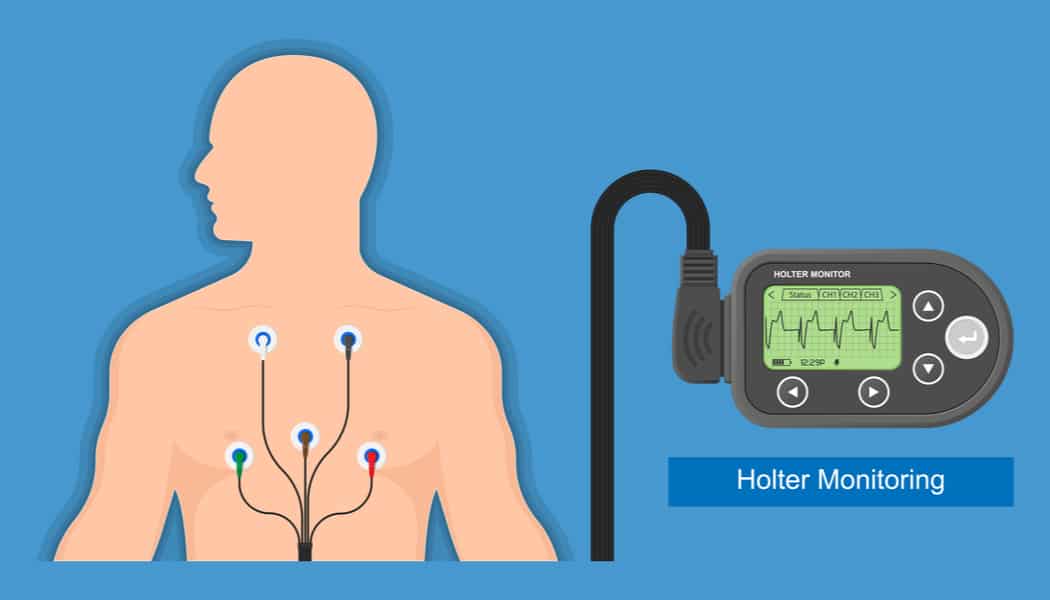 An extended ECG test is done to detect any transient irregular heartbeat a patient may have during their normal daily routines as it may not show during a resting ECG in the clinic. The patient will wear an ECG recorder on their chest and bring it home for an extended period (24-72hrs). The ECG recorder will then be brought back to the clinic for downloading and analysis of the data.
An extended ECG test is done to detect any transient irregular heartbeat a patient may have during their normal daily routines as it may not show during a resting ECG in the clinic. The patient will wear an ECG recorder on their chest and bring it home for an extended period (24-72hrs). The ECG recorder will then be brought back to the clinic for downloading and analysis of the data.
24h Ambulatory Blood Pressure Monitoring (ABP)

ABP is done to monitor a patient’s blood pressure for 24 hours while they continue their daily activities. This 24-hour monitoring allows the doctor to study the variations of blood pressure throughout the day. Patients will wear a BP cuff on their arm and the cuff is hooked onto a small device. The device will measure blood pressure automatically during fixed intervals in the day and night.
Other tests, e.g. cardiac MRI, carotid intima-media thickness test
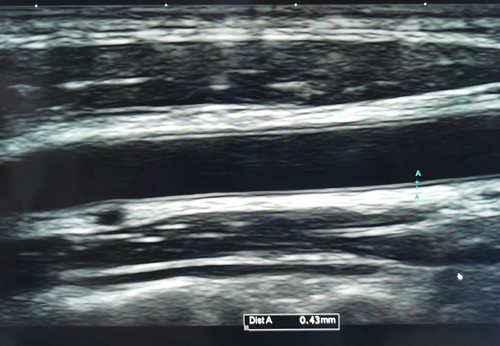 There are also tests to be done to assess for risk factors of heart disease, with the common ones being diabetes mellitus, high cholesterol, high blood pressure, kidney disorders and thyroid disorders.
There are also tests to be done to assess for risk factors of heart disease, with the common ones being diabetes mellitus, high cholesterol, high blood pressure, kidney disorders and thyroid disorders.
These may also include extended BP monitoring to assess for BP pattern throughout the day, or ultrasound of the carotid arteries to assess for stroke risk
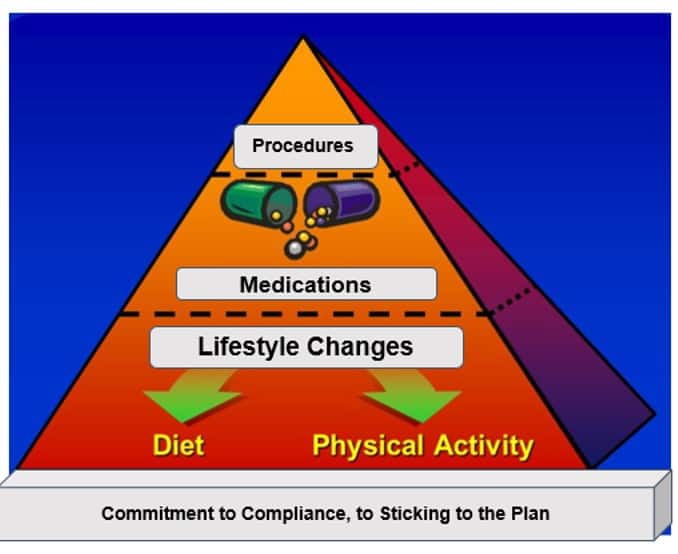
Post-screening Recommendations
After the relevant tests, there will be a follow-up consultation to explain the results of the tests and to come to a diagnosis and map out a management plan as needed.
The management plan may include recommendations for more targeted tests and a comprehensive therapeutic plan.
Therapeutic plans broadly involve a therapeutic pyramid.
The base of the pyramid involves the adoption of a healthier lifestyle. This involves stopping unhealthy habits like smoking and making healthier dietary and physical activity choices.
The patient will have to be committed to being compliant with the agreed-upon treatment plan.
The next step would involve medications if needed. Following medications would be procedures at the apex of the pyramid.
At each point, indications, risks and alternatives to the therapeutic choice will need to be discussed and management plans mutually agreed upon.
How often should I go for heart screening?
Heart screen applies to individuals with no symptoms of heart disease, eg chest discomfort, palpitations, breathlessness.
Individuals with symptoms should see their doctor for a diagnostic assessment and not a screening assessment.
The frequency of heart screen will depend on cardiac risk factors present. In general, risk factors for heart disease, eg blood sugar, blood cholesterol, blood pressure should be checked once or twice a year.
For screening of heart disease, this can be done once in 1-3 years depending on the presence of cardiac risk factors.

Gerard Leong Cardiology Clinic (GLCC) Services
At GLCC, we provide an evidence-based and appropriate comprehensive range of heart tests and heart screening packages, in a patient-centred and professional manner with the aim to let you live your life with a healthy or healthier heart! The range of investigations include
- Electrocardiogram (ECG)
- Extended 24-48-72H ECG
- 24h Ambulatory Blood Pressure Monitoring
- Echocardiogram
- Stress Tests with Echocardiogram or ECG
- Carotid Intima-Media Thickness Test
- Non-invasive CT Coronary Artery Calcium (CAC) Scoring
- Non-invasive CT Coronary Angiogram (CTCA)
- Invasive Cardiac Catheterization (ICA)
- Other tests, eg cardiac MRI
